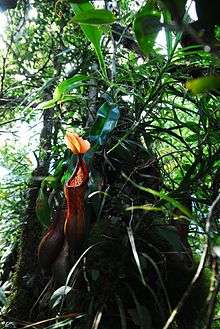Nepenthes petiolata
| Nepenthes petiolata | |
|---|---|
 | |
| Nepenthes petiolata from Mount Masay, the type locality | |
| Scientific classification | |
| Kingdom: | Plantae |
| (unranked): | Angiosperms |
| (unranked): | Eudicots |
| (unranked): | Core eudicots |
| Order: | Caryophyllales |
| Family: | Nepenthaceae |
| Genus: | Nepenthes |
| Species: | N. petiolata |
| Binomial name | |
| Nepenthes petiolata Danser (1928)[1] | |
| Synonyms | |
| |
Nepenthes petiolata (/nᵻˈpɛnθiːz ˌpiːtioʊˈlɑːtə/; from Latin: petiolatus "petiolate", referring to leaf attachment) is a highland Nepenthes pitcher plant species endemic to Mindanao island in the Philippines, where it grows at an elevation of 1450–1900 m above sea level.[2]
 N. petiolata holotype (Elmer 13705)
N. petiolata holotype (Elmer 13705)
Natural hybrids
Nepenthes petiolata may itself have evolved from a cross between N. alata and N. truncata.[2] Examples of other Nepenthes species with a putative hybrid origin include N. hamiguitanensis, N. hurrelliana, and N. murudensis.[2][5]
References
- ↑ Danser, B.H. 1928. Nepenthes petiolata DANS., spec. nova.. In: The Nepenthaceae of the Netherlands Indies. Bulletin du Jardin Botanique de Buitenzorg, Série III, 9(3–4): 249–438.
- 1 2 3 McPherson, S.R. 2009. Pitcher Plants of the Old World. 2 volumes. Redfern Natural History Productions, Poole.
- 1 2 Kurata, S. & M. Toyoshima 1972. Philippine species of Nepenthes. The Gardens' Bulletin Singapore 26(1): 155–158. Abstract
- 1 2 Cheek, M.R. & M.H.P. Jebb 2001. Nepenthaceae. Flora Malesiana 15: 1–157.
- ↑ Gronemeyer, T., A. Wistuba, V. Heinrich, S. McPherson, F. Mey & A. Amoroso 2010. Nepenthes hamiguitanensis (Nepenthaceae), a new pitcher plant species from Mindanao Island, Philippines. In: S.R. McPherson Carnivorous Plants and their Habitats. Volume 2. Redfern Natural History Productions, Poole. pp. 1296–1305.
Further reading
- Bauer, U., C.J. Clemente, T. Renner & W. Federle 2012. Form follows function: morphological diversification and alternative trapping strategies in carnivorous Nepenthes pitcher plants. Journal of Evolutionary Biology 25(1): 90–102. doi:10.1111/j.1420-9101.2011.02406.x
- Bonhomme, V., H. Pelloux-Prayer, E. Jousselin, Y. Forterre, J.-J. Labat & L. Gaume 2011. Slippery or sticky? Functional diversity in the trapping strategy of Nepenthes carnivorous plants. New Phytologist 191(2): 545–554. doi:10.1111/j.1469-8137.2011.03696.x
- Cantley, R. 2000. Nepenthes of the Philippines. [video] The 3rd Conference of the International Carnivorous Plant Society, San Francisco, USA.
- Co, L. & W. Suarez 2012. Nepenthaceae. Co's Digital Flora of the Philippines.
- Macfarlane, J.M. 1927. The Philippine species of Nepenthes. The Philippine Journal of Science 33(2): 127–140.
- Mann, P. 1998. A trip to the Philippines. Carnivorous Plant Newsletter 27(1): 6–11.
- McPherson, S.R. & V.B. Amoroso 2011. Field Guide to the Pitcher Plants of the Philippines. Redfern Natural History Productions, Poole.
- (German) McPherson, S. & T. Gronemeyer 2008. Die Nepenthesarten der Philippinen Eine Fotodokumentation. Das Taublatt 60(1): 34–78.
- Meimberg, H., A. Wistuba, P. Dittrich & G. Heubl 2001. Molecular phylogeny of Nepenthaceae based on cladistic analysis of plastid trnK intron sequence data. Plant Biology 3(2): 164–175. doi:10.1055/s-2001-12897
- (German) Meimberg, H. 2002. "Molekular-systematische Untersuchungen an den Familien Nepenthaceae und Ancistrocladaceae sowie verwandter Taxa aus der Unterklasse Caryophyllidae s. l.." (PDF). Ph.D. thesis, Ludwig Maximilian University of Munich, Munich.
- Meimberg, H. & G. Heubl 2006. Introduction of a nuclear marker for phylogenetic analysis of Nepenthaceae. Plant Biology 8(6): 831–840. doi:10.1055/s-2006-924676
- Meimberg, H., S. Thalhammer, A. Brachmann & G. Heubl 2006. Comparative analysis of a translocated copy of the trnK intron in carnivorous family Nepenthaceae. Molecular Phylogenetics and Evolution 39(2): 478–490. doi:10.1016/j.ympev.2005.11.023
| Wikimedia Commons has media related to Nepenthes petiolata. |
This article is issued from Wikipedia - version of the 11/30/2016. The text is available under the Creative Commons Attribution/Share Alike but additional terms may apply for the media files.